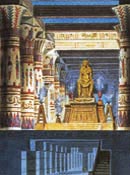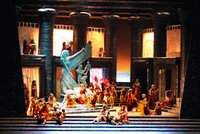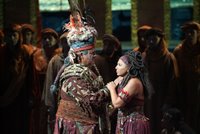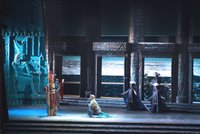Opera at the Arena of Verona – Aida
written by David Anderson limited rights reserved ViewItaly.blogspot.com
 The dispute with Telecom Italia over the services we could sell or not was creating serious financial problems for the company. All this talk about free market and deregulation was just that, a bunch of jabber. The market could never be deregulated as long as you were required to purchase your primary goods from the monopolistic competitor. Three financial controls, by the outside auditors, in 6 months were driving me insane. Another hour or so and everything would be ready for Tuesday’s meeting but I am distracted.
The dispute with Telecom Italia over the services we could sell or not was creating serious financial problems for the company. All this talk about free market and deregulation was just that, a bunch of jabber. The market could never be deregulated as long as you were required to purchase your primary goods from the monopolistic competitor. Three financial controls, by the outside auditors, in 6 months were driving me insane. Another hour or so and everything would be ready for Tuesday’s meeting but I am distracted.Saturday in the office is always quiet and I still have several hours before meeting Luisa in Verona for dinner. She had received tickets to the Aida and her boyfriend was in New Zealand windsurfing so I became the lucky candidate. I always enjoyed the opera; music has a profound effect on me. I could never really understand why but music penetrates me to the core. The few times I have watched an opera I find myself completely immersed in the period, feeling every emotion, every surprise, and coming away drained emotionally.
The trip to Verona takes about an hour from Seriate where the offices are. My mind is completely occupied with the various situations that need to be resolved for the company and before I realize it I arrive at the restaurant. Verona is an antique city and the city center has numerous unpretentious restaurants that seem to be cut into the foundations of the Roman architecture. Flat pane glass with a small patio in front closed in by potted evergreens. The evening is warm and the primary traffic has left the city so we take a table outside on the patio.
Luisa is concerned about my demeanor. She is my CPA and handles liquidations for the court in Udine and knows well the things I have to take on in the next weeks. We have been friends for a long time and she can tell that I am preoccupied with other things. In the style of an Italian woman she redirects my attention to the food, the wine, and stories of her boyfriend windsurfing. The opera begins at 9:15, just after dark, so our time is limited. Dinner turns into a couple glasses of wine and some fantastic snacks with salmon, primo sale, tartufo, and some dried meats.
We decide to walk to the Arena, just outside the city center. A cool breeze flows down from the mountains as we stroll toward the old walls. The lights of the Arena are clearly visible like the beacon of a lighthouse. Like moths to a bright light in the night, individuals and groups flutter closer to the Arena. Teenagers, with more piercing than visible skin, walk next to businessmen in suit and tie. Women adorned in the latest fashion and girls in tight jeans with tattoos mingle, not talking together but moving toward the entrance.
Luisa had great tickets; in the middle field about 10 rows back. The stage is huge, although dark. The orchestra practices their scales clearly audible over the noise of 20,000 people filing in to find their seats. The massive walls surrounding the field made of heavy block rocks eliminate the modern world. In the cool night breeze you can smell the antique boulders that make up the outer walls. The stage, that spans the width of the field, is dark. Flashes of light appear and disappear like fireflies as the stagehands position the final props.
The lights, in the seating area, dim. The crowd silences as the orchestra begins to place. The stage lights reveal enormous statues on either side while in the background temples, monuments and pyramids. The scene takes place in Menfi, Egypt.
 The principle characters Ramfis, the high priest, and Radame's, captain of the Pharos armies are discussing the probable attack from the Ethiopians. Radame's desires to be named the warrior to lead the king's armies into battle against the Ethiopians. The princess of Ethiopia, Aida, has fallen into the hands of the Egyptians and Radames loves her. If he could lead the king's armies and return victoriously he could then return Ethiopia to the princess where he would be king. However Radame's also has a story with the princess of Egypt, Amneris. Amneris is deeply in love with Ramades but suspects that he also has a story with slave, Aida. Suspicion and mistrust are evident as Amneris befriends the slave to uncover the truth. Aida responds with subtle words of affection while she launches looks of both an enamored lover and interrogative detective.
The principle characters Ramfis, the high priest, and Radame's, captain of the Pharos armies are discussing the probable attack from the Ethiopians. Radame's desires to be named the warrior to lead the king's armies into battle against the Ethiopians. The princess of Ethiopia, Aida, has fallen into the hands of the Egyptians and Radames loves her. If he could lead the king's armies and return victoriously he could then return Ethiopia to the princess where he would be king. However Radame's also has a story with the princess of Egypt, Amneris. Amneris is deeply in love with Ramades but suspects that he also has a story with slave, Aida. Suspicion and mistrust are evident as Amneris befriends the slave to uncover the truth. Aida responds with subtle words of affection while she launches looks of both an enamored lover and interrogative detective. A messenger arrives. The forces of Ethiopia, lead by Almoners, have left their encampments and are marching on Tebe. It is war. The music pounds the crescendo of both pride and fear. The king calls his guards, captains, ministers and priests to announce his general. It is Ramade's! Aida is torn between the insane love of her terrible enemy and the love for her father. She prays to her god Numi to pity her and to send her love home victorious. Amneris hears the prayer and realizes that she truly has a rival.
A messenger arrives. The forces of Ethiopia, lead by Almoners, have left their encampments and are marching on Tebe. It is war. The music pounds the crescendo of both pride and fear. The king calls his guards, captains, ministers and priests to announce his general. It is Ramade's! Aida is torn between the insane love of her terrible enemy and the love for her father. She prays to her god Numi to pity her and to send her love home victorious. Amneris hears the prayer and realizes that she truly has a rival.As the lights darken on the first act, I sigh in relief, realizing that many had the same release. Luisa is tense as we talk in anticipation about the developing contrast. What would Amneris do? Would Ramade's return alive? Would Egypt fall?
 The lights in the amphitheatre dim again and the scene on the stage has changed. In the apartment of Amneris young Ethiopians slaves are dancing for the princess. She is preparing for the Egyptian Victory celebration. Aida enters the room and Amneris cannot resist the temptation to confront her rival. Amneris expresses condolences for Aida's pain of the loss of the armies; with guile she lies to Aida and tells her that Ramade's has also been killed in battle. Aida's heart is broken and openly mourns his death. Amneris humiliates Aida and threatens her life causing Aida to beg forgiveness.
The lights in the amphitheatre dim again and the scene on the stage has changed. In the apartment of Amneris young Ethiopians slaves are dancing for the princess. She is preparing for the Egyptian Victory celebration. Aida enters the room and Amneris cannot resist the temptation to confront her rival. Amneris expresses condolences for Aida's pain of the loss of the armies; with guile she lies to Aida and tells her that Ramade's has also been killed in battle. Aida's heart is broken and openly mourns his death. Amneris humiliates Aida and threatens her life causing Aida to beg forgiveness. The party begins, the trumpets call the people to the celebration and the people arrive to honor their king. The "Glory of Egypt", Amneris, sits beside her father on the thrown. A parade of the troops with banners flying, sacred vases and statues of the gods precede the dancing slaves bearing the spoils of war. The people exalt as Ramade's, their hero, makes his triumphant entrance. Amneris places the crown of the Victor on Ramade's and the king promises to grant him any desire he wishes.
The party begins, the trumpets call the people to the celebration and the people arrive to honor their king. The "Glory of Egypt", Amneris, sits beside her father on the thrown. A parade of the troops with banners flying, sacred vases and statues of the gods precede the dancing slaves bearing the spoils of war. The people exalt as Ramade's, their hero, makes his triumphant entrance. Amneris places the crown of the Victor on Ramade's and the king promises to grant him any desire he wishes.In the tradition of true warriors Ramade's asks that all of the prisoners be summoned and requests they be granted life and freedom. The prisoners unite with Ramade's and beg for mercy. Ramfis, although he recognizes how powerful this army is, cannot refuse the request however to guarantee the peace decides to keep Aida and one warrior as prisoners. This warrior is Amonasro, father of Aida, who hides his identity and states that he, himself, has buried the Ethiopian king who was killed in battle. However this is not the only gift, even though undesired, given to the hero. He is betrothed to Amneris, who is joyous over her victory in love. Solemn tones fill the air as Aida cries over her cruel destiny and Amonasro swears revenge and the lights dim.
 The quiet waters of the Nile, granite rocks spaced with palm trees, the temple of Iside looms in the background against the horizon. A boat sits quietly on the bank. The high priest captains the boat while Amneris implores the gods to protect her upcoming nuptials. On the same bank, Aida awaits the arrival of Ramade's, lamenting her homeland. Amonasro hides in the shadows. He has convinced his daughter, threatening her, to deceive her lover to save her people. A new war looms on the horizon. The Ethiopians are ready to attack the Egyptians with every means. Aida must induce Ramade's to reveal the battle plans of the Pharaoh’s military. Aida is languishes in the conflict as she meets her lover. As she talks of their future together, she also must obtain the information requested by her father.
The quiet waters of the Nile, granite rocks spaced with palm trees, the temple of Iside looms in the background against the horizon. A boat sits quietly on the bank. The high priest captains the boat while Amneris implores the gods to protect her upcoming nuptials. On the same bank, Aida awaits the arrival of Ramade's, lamenting her homeland. Amonasro hides in the shadows. He has convinced his daughter, threatening her, to deceive her lover to save her people. A new war looms on the horizon. The Ethiopians are ready to attack the Egyptians with every means. Aida must induce Ramade's to reveal the battle plans of the Pharaoh’s military. Aida is languishes in the conflict as she meets her lover. As she talks of their future together, she also must obtain the information requested by her father. When Amonasro hears the information he needs, he reveals his presence to the surprised Ramade's. Amonasro tells Ramade's that he is indeed king of the Ethiopians and tries to convince Ramade's to join the cause. Amneris, doubtful of her promised husband's intentions, follows Ramade's and hears all. She tells the high priests of the treason committed and the true nature of the prisoner, Amonasro. Tension mounts as the guards search for the prisoners as Ramade's helps them to escape. Ramade's turns himself in to the Ramfis, ready to pay for his crime.
When Amonasro hears the information he needs, he reveals his presence to the surprised Ramade's. Amonasro tells Ramade's that he is indeed king of the Ethiopians and tries to convince Ramade's to join the cause. Amneris, doubtful of her promised husband's intentions, follows Ramade's and hears all. She tells the high priests of the treason committed and the true nature of the prisoner, Amonasro. Tension mounts as the guards search for the prisoners as Ramade's helps them to escape. Ramade's turns himself in to the Ramfis, ready to pay for his crime.I feel a pain in my arm. Thinking that it is simply transference from the opera I pay no mind but as the lights dim on the stage I realize that it is Luisa who is gripping my arm and her fingernails are just about cutting my skin. Slowly she releases her claws and apologizes, indicating that she was carried away by the drama.
 The lights come up on the final act. Beautiful and spacious rooms in the palace of the king of Egypt, ominously evidenced are the doors on the left side that lead to the dungeons. Amneris, torn between her broken pride and her love of Ramades, calls for the fallen general to be brought before the court. She wishes to save her love, her happiness and her future marriage long awaited. Ramades, however, is resigned to his fate and no longer wishes to hide his love for Aida. His only thought is of Aida, the slave he freed who is now to return to her people. The high priests want to execute the traitor; Amneris curses herself for the jealousy she was unable to control: she begs and pleads for the life of Ramades. Ramades does not defend himself and the sentence of death is pronounced!
The lights come up on the final act. Beautiful and spacious rooms in the palace of the king of Egypt, ominously evidenced are the doors on the left side that lead to the dungeons. Amneris, torn between her broken pride and her love of Ramades, calls for the fallen general to be brought before the court. She wishes to save her love, her happiness and her future marriage long awaited. Ramades, however, is resigned to his fate and no longer wishes to hide his love for Aida. His only thought is of Aida, the slave he freed who is now to return to her people. The high priests want to execute the traitor; Amneris curses herself for the jealousy she was unable to control: she begs and pleads for the life of Ramades. Ramades does not defend himself and the sentence of death is pronounced!The focus moves to the golden temple reflecting the light of the volcano; underneath, the crypt in which Ramades will be buried alive. The high priests close the entrance and as the last brick is laid to seal the exit, Radames calls the name of his love for one last time. As in a dream, Aida appears, but it is not a vision, she has come to die with him. The lovers embrace, united without remorse, and leave the cruel world that has condemned them. Amneris prays at the tomb of her love, begging for peace.
The lights come up on the audience. All around applause explode. With tearful, yet joyous, faces the crowd calls “Bravo!” As I returned home I realized that I had completely forgotten about all the work I had to finish. I was emotionally drained but content, renewed and refreshed. Opera is sung in Italian, but it is not necessary to speak Italian to gain from this experience. The scenery, music, and atmosphere carry you into another world. Although you can enjoy opera anywhere in the world, participating in Italy at the Arena or at one of the great opera houses is at a much higher level. It is well worth an evening and will broaden your mind.
Tags: Verona Opera Arena di Verona Aida Italy
Labels: culture, Italian Vacations, Opera, Veneto, Verona


4 Comments:
The picture of the opera were great.
4:04 AM
The opera is even better! I hope you have an opportunity to visit the Arena. It is an experience.
3:13 PM
I was in Verona for five days last summer and saw La Boheme in the Arena of Verona. It was majestic!?
5:16 PM
Joy - It has been awhile since I have been to the Arena. I envy you!
5:58 PM
Post a Comment
<< Home